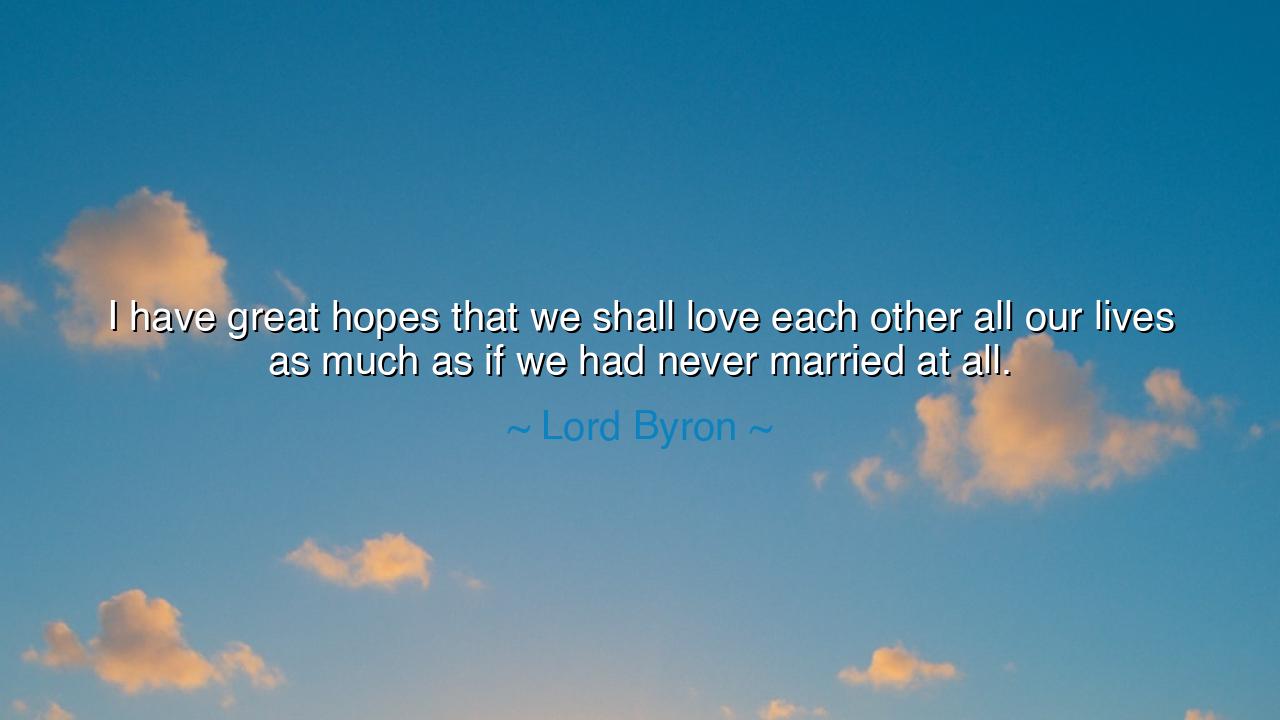
I have great hopes that we shall love each other all our lives
I have great hopes that we shall love each other all our lives as much as if we had never married at all.






The words of Lord Byron shimmer with both passion and paradox: “I have great hopes that we shall love each other all our lives as much as if we had never married at all.” In this utterance lies the poet’s recognition of a truth known since antiquity—that the fire of desire often dims when bound in formal ties. He voices the dream that his love might resist that fading, that it might burn as fiercely within marriage as it did in the free and unclaimed days before.
Byron speaks from the perspective of a man who knew both the ecstasy and the ruin of passion. His life was strewn with intense romances, and he had seen how quickly the thrill of forbidden longing could vanish once transformed into duty. Thus his hope was a prayer—that marriage, instead of cooling the flame, might enshrine it, preserving the wild devotion of lovers within the covenant of vows.
History offers us lessons in this same tension. Consider the marriage of Abelard and Héloïse in medieval France. Their union, born of an all-consuming love, was tested by secrecy, scandal, and tragedy. Héloïse herself confessed that passion often burns brightest outside the bonds of law. Yet even through trials, their letters reveal a longing to preserve the fire of their first days, echoing Byron’s yearning that marriage need not extinguish, but rather protect, the sacred flame.
The wisdom in Byron’s words is both warning and blessing. They warn that marriage must not become complacency, that lovers must continue to woo one another as though no vows had been spoken. But they bless also the possibility that true love, when tended, may remain forever young, unshackled by routine, eternal in its freshness. For if two souls guard their passion with care, then marriage becomes not the grave of love, but its sanctuary.
Therefore, let this lesson be preserved: do not let the vow silence the song, nor let the covenant weaken the desire that birthed it. Strive always to love as if you had not yet attained, to cherish as though you were still in pursuit. For then, as Byron hoped, marriage shall not diminish passion, but sanctify it, making of human love a fire that endures through the years, as radiant in age as it was in youth.






HMTao Thi Hong Mai
There’s an honesty in this line that’s rare in discussions about marriage. Byron seems aware that marriage can sometimes drain the thrill of romance. It makes me wonder — was he being cynical about the institution, or genuinely optimistic about love’s resilience? Perhaps he’s acknowledging that the best marriages are those where both partners choose to keep loving as freely as they did before the vows.
AAn
What a beautifully melancholic thought. Byron’s words almost sound like a plea — that love should stay as light and spontaneous as it was before marriage made it serious. I think many couples can relate to that hope: to love with the same excitement and freedom they once had. But can love remain unchanged, or must it transform to survive the realities of married life?
DTDiepAnh Tran
This sentiment captures a fascinating tension between romance and reality. Byron seems to long for a love untainted by the obligations of marriage — as if true affection thrives best without social contracts. It makes me question whether love and marriage naturally coexist, or whether one always alters the other. Can we really sustain that same spark once familiarity and duty enter the picture?
NPnguyen phuong
I find this quote quite bittersweet. It suggests a desire to preserve the freshness of love even after marriage formalizes it. But isn’t that one of the hardest things to do? Over years of shared life, routines, and struggles, love inevitably evolves. I’d love to know whether Byron meant that as an ideal to strive for — or as a clever acknowledgment that love before marriage often feels purer and freer.
Mminhthao
This line feels both romantic and ironic at the same time. It’s as if Byron is acknowledging how marriage can sometimes dull the passion that once felt effortless. I can’t help but wonder if he was expressing hope or skepticism — maybe both. Is he saying that true love should remain untouched by the weight of commitment, or is he subtly mourning the way marriage can change affection over time?